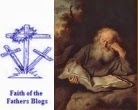Bishop, Early Church Father and Doctor of the Church
Saint
Isidore of Seville (also known as Isidore the Bishop; Schoolmaster of
the Middle Ages) was born in 560 A.D., at Cartagena, Spain. He was
the son of Severianus and Theodora, people known for their piety. He
was the younger brother of Saint Fulgentius, Saint Florentina, and
Saint Leander of Seville, who raised him after their father's death.
At first he
was a poor student, but he gave the problem over to God and became
one of the most learned men of his time. He was ordained a priest,
and he helped his brother Leander, archbishop of Seville, in the
conversion of the Visigoth Arians. His brother Saint Leander died
around 600, and in 601 Isidore succeeded him as Archbishop of
Seville.
During his
episcopacy he devoted his energies to promoting science, establishing
schools and convents, and welding into one single nation the various
peoples composing the Hispano-Gothic kingdom. Saint Isidore was a
teacher, a founder, and a reformer. He required seminaries in every
diocese, and he wrote a rule for religious orders. He was a prolific
writer, his works including a dictionary, an encyclopedia, a history
of Goths, and a history of the world beginning with creation.
He also
introduced the works of Aristotle to Spain. He completed the
Mozarabic liturgy which is still in use in Toledo, Spain. He presided
at both the Second Council of Seville in 619, and the Fourth Council
of Toledo in 633. He is important for his literary work, and his
mastery of all branches of knowledge of his day.
Saint
Isidore of Seville is generally held to be the last of the Latin
Fathers of the Church, and he was proclaimed Doctor of the Church by
Pope Benedict XIV in 1722. He became the leading candidate for patron
of computer users and the Internet in 1999.
Saint
Isidore of Seville died of natural causes in 636 at Seville, Spain.
His relics are in his own church at Leon, Spain.
Below are
some quotations from Saint Isidore of Seville:
Prayer
purifies us, reading instructs us. Both are good when both are
possible. Otherwise, prayer is better than reading. If a man wants to
be always in God’s company, he must pray regularly and read
regularly. When we pray, we talk to God; when we read, God talks to
us. All spiritual growth comes from reading and reflection. By
reading we learn what we did not know; by reflection we retain what
we have learned. Reading the holy Scriptures confers two benefits. It
trains the mind to understand them; it turns man’s attention from
the follies of the world and leads him to the love of God. The
conscientious reader will be more concerned to carry out what he has
read than merely to acquire knowledge of it. In reading we aim at
knowing, but we must put into practice what we have learned in our
course of study. The more you devote yourself to study of the sacred
utterances, the richer will be your understanding of them, just as
the more the soil is tilled, the richer the harvest. The man who is
slow to grasp things but who really tries hard is rewarded, equally
he who does not cultivate his God-given intellectual ability is
condemned for despising his gifts and sinning by sloth. Learning
unsupported by grace may get into our ears; it never reaches the
heart. But when God’s grace touches our innermost minds to bring
understanding, his word which has been received by the ear sinks deep
into the heart.
* *
* * * * *
Heresy is
from the Greek word meaning ‘choice’…. But we are not permitted
to believe whatever we choose, nor to choose whatever someone else
has believed. We have the Apostles of God as authorities, who did
not…choose what they would believe but faithfully transmitted the
teachings of Christ. So, even if an angel from heaven should preach
otherwise, he shall be called anathema.
* *
* * * * *
The more
we are afflicted in this world, the greater is our assurance in the
next; the more sorrow in the present, the greater will our joy be in
the future.
* *
* * * * *
Confession
heals, confession justifies, confession grants pardon of sin. All
hope consists in confession. In confession there is a chance for
mercy. Believe it firmly. Do not doubt, do not hesitate, never
despair of the mercy of God. Hope and have confidence in confession.


